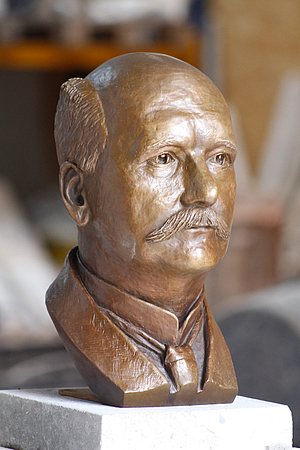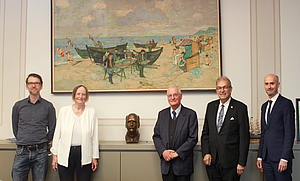Albrecht Kossel
Who was Albrecht Kossel?
Professor Albrecht Kossel was a world-renowned scientist.
Born and raised in Rostock in 1853, he studied medicine in Strasbourg and Rostock and then turned to a subject that was up and coming at the time, physiological chemistry (biochemistry). Even as a young scientist, Kossel was able to detect guanine, adenine, thymine and cytosine in the nucleic acid. If you look at the DNA model developed much later by other researchers, it is Kossel's nucleic bases whose sequence in the molecular strand encodes biological inheritance. They form the ABC of life.
Albrecht Kossel received the Nobel Prize in 1910 for these discoveries and other groundbreaking discoveries, especially in the field of protein chemistry. He was very famous during his lifetime. Kossel's nucleobases are of paramount importance for 21st century biotechnology, not only for fighting the Covid-19 pandemic but for many other drug therapies and beyond.
Our institute and the southern Rostock station forecourt have since been named after Albrecht Kossel. However, he is hardly known, although many biographies have been published about him. In 2019, Edith Framm and Joachim Framm published another biography [1]. They endeavored to describe his life and work in a novel-like form in order to make Kossel accessible to a larger circle of readers. Your journey through time with Albrecht Kossel takes you to Strasbourg, Berlin, Marbung and Heidelberg to the glorious epoch of German natural science before the First World War. The authors also compiled the findings of their many years of research in a paper (https://doi.org/10.1002/ciuz.202010003) [2] and presented the bust of Albrecht Kossel, created by the Berlin sculptor Rico Rensmeyer and the Kunstgiesserei Alt-Glienicke, to the university on October 30, 2021
It will be installed in the institute in 2023.
Albrecht Kossel was very attached to his hometown of Rostock, all his life a self-confessed native of Mecklenburg. In 1927 his colleague Siegfried Edlbacher wrote in an obituary: “Out of the most primitive views, a world of concepts has harmoniously formed, which will broadly form the framework for undreamt-of knowledge. A classic spirit wafts towards us from the whole. May the quiet, clear spirit that breathes from his works be a blessing to science.”
The biologist Fritz Kaudewitz honored Kossel in a particularly impressive way: “It wasn’t just a great scientist who went there with him. A person whose goodness and inner balance, whose truthfulness and sense of duty were absolutely perfect, had completed his life. To those who came after him and continued his work, he may have seemed like a shining example of how real scientific achievement is supported by the mental strength of a great personality who is balanced within himself.” Ulf Lagerkvist wrote in 1998: "... his elucidation of the chemical nature of some building blocks that make up nucleic acids and chromatine has secured immortality for this exceedingly modest and almost shy man."
[1] Albrecht Kossel und die DNA. Framm, E. und J. Framm, Romanbiografie, Koch und Raum Wismar, 2019.
[2] Albrecht Kossel und die Nukleinbasen. Framm, E. und J. Framm, Chemie in unserer Zeit, 2021 im Druck.


